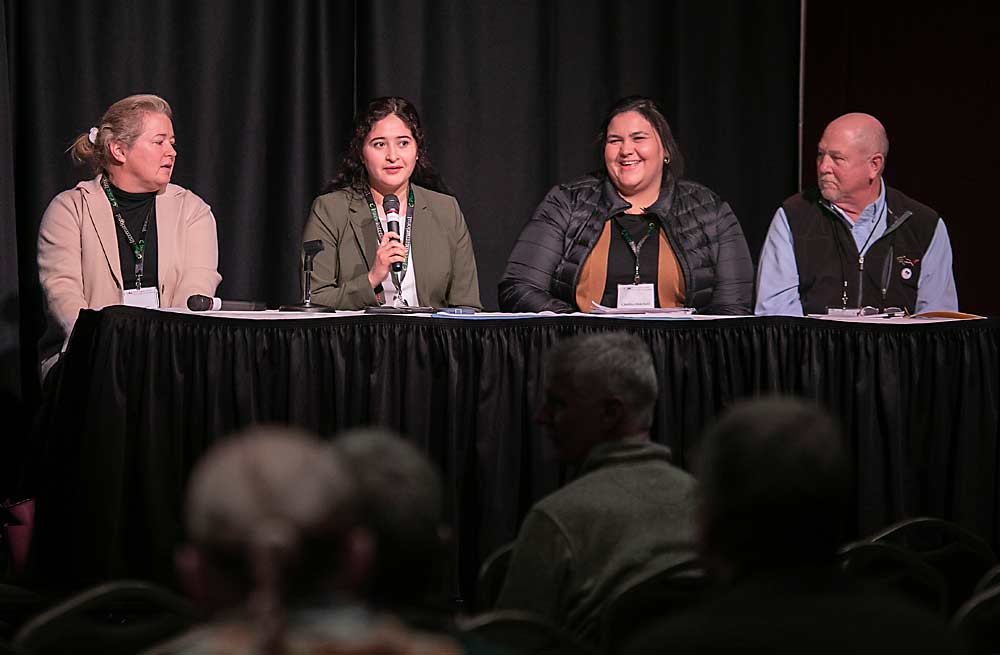
Harvest at night. Ask state labor regulators for a consult. Take a supervisor to lunch.
Those were just a few tips shared during a labor panel in December at the Washington State Tree Fruit Association Annual Meeting in Wenatchee.
A grower, a fruit company human resources director, a labor attorney and a safety specialist for the Washington Farm Bureau teamed up to share some practical tips for growers trying to navigate the rapidly changing regulatory environment of Washington agriculture and truly provide a safe workplace for employees.
“It’s because we care,” said Flor Maldonado, a Tonasket grower.
Joining her on the panel were Sarah Wixson, attorney with Stokes Lawrence law firm in Yakima; Chafeka Abdellatif, human resources director at Kershaw Cos.; and Corwyn Fischer, assistant safety and claims director at the Washington Farm Bureau.
The discussion followed presentations about new or proposed federal and state regulations regarding workplace safety during extreme heat and wildfire smoke. The past few summers, states have passed temporary emergency rules. Now, Washington state and the federal government are drafting permanent versions.
One of the sticky points is how much responsibility for enforcement falls on employers. For example, under a state smoke proposal, when the air quality reaches a certain level of pollution, employers would be required to enforce that their employees wear N95 masks, not just provide them. Many of those workers don’t want to wear them.
Maldonado said that was a challenge during smoky days the past few years under emergency rules.
“The hardest thing was getting people to actually use the masks,” she said.
M&A Orchards, which she runs with her two brothers, has the best luck when they cover the importance of safety rules with supervisors in an intimate way, such as over lunch or other personal meetings. Explain the “why” of the rules to one or two critical leaders, she said.
“Don’t just say, ‘Hey, this is a rule, make people do it,’” she said.
Another bit of advice echoed by most of the panelists: Schedule a consultation with the state Department of Labor and Industries. The program allows farms to voluntarily invite a consultant to scan for hazards, then gives the operator time to fix them. If they do, the farms are exempt from surprise inspections for a while.
A representative with the Washington Farm Bureau, which has its own safety and claims program, will tag along and then go over the report with the farmer, Fischer said.
“We’ll be taking notes as well,” he said.
Kershaw recently had a consultation at a warehouse and found it helpful, Abdellatif said. Unlike a compliance inspector, the consultant lets the employer guide the tour.
“Through that process, we avoided some potential problems that we could have had if it had been a compliance visit rather than a consultation visit,” Abdellatif said.
Night harvest was another topic. Maldonado said her workers really liked it after two years. Fischer and Wixson suggest growers consider offering a premium for night picking. Kershaw didn’t harvest at night but sometimes started work as early as 4 a.m., Abdellatif said.
Fischer also recommends managers double-check to make sure air-conditioning works on buses or vans before sending them out with employees in hot weather. The vehicles can also be used for cooling breaks. Abdellatif said her company delivers shade tents and picnic tables to workers during extreme heat.
Wixson, who often represents agricultural employers, warned growers to mind all regulations, not just new ones regarding heat and smoke, and document every effort to enforce rules, she said.
“That’s your only ‘Get Out of Jail Free’ card if there is noncompliance,” she said.
—by Ross Courtney






Leave A Comment